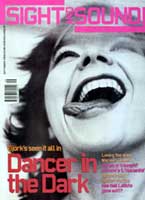Primary navigation

Germany 1999
Reviewed by Jos Arroyo
Our synopses give away the plot in full, including surprise twists.
Over images of spotted hyenas in the wild, director Monika Treut tells us that nature can be more inventive than culture. The female of this species has a clitoris that looks like a penis but also serves as a birth channel; she's larger, heavier and more aggressive than her male counterpart and leads other hyenas in packs.
Treut then introduces Sandy Stone, academic and "Goddess of Cyberspace". A series of interviews with people who inhabit a variety of gender identities follows.
With cinematographer Elfi Mikesch, Monika Treut has over the years produced a series of films - notably Seduction: The Cruel Woman (1985), about a Hamburg dominatrix, and The Virgin Machine (1988) - which consistently pushed the envelope in terms of sexual and gender representation. But her latest film Gendernauts, a documentary focusing on a group of transgender people, is a disappointment both as a film and as an argument about gender.
Formally, Gendernauts is a grubby exercise. Treut makes no attempt to create moments of poetry or beauty. What we get is stock footage of hyenas, followed by crudely shot talking-head interviews with people who are redefining traditional gender-based roles. Treut's main concern during the shooting seems to be that the subject is in the frame and the sound audible. She makes some concession to old-school vérité aesthetics by alerting the viewer to her role shaping the movie, but her occasional narration, mostly paeans to San Francisco and congratulatory appreciations of her subjects' adopted roles, has a touch of voice-of-God smugness about it.
As an argument on gender, the film is confusing and contradictory. Treut holds up hyenas as an example of how "nature can be more inventive than culture." (The female of the species has a clitoris which looks like a penis and tends to be more aggressive than the male.) But her film then shows how such medical procedures as testosterone shots and surgery are used precisely to change 'nature'. Sandy Stone, a professor at Berkeley and the film's intellectual guide, goes on to cite the figure of the cyborg as an ideal: "cyborgs are us, made up of many parts, continually in motion and in change... made of human and machine, mechanic and electronic." Perhaps Treut is arguing here that both nature - as represented by the hyenas - and culture - represented by the cyborg - are proof that traditional concepts of gender don't apply in the new millennium. But while the film tells us that there are more genders than society allows for (one of the film's talking heads, Annie Sprinkle, uses the multiplicity of bird species as a model for how different types of gender might exist alongside one another) this radical message is contradicted by what Gendernauts shows.
Though the subjects of Gendernauts - mainly artists and intellectuals - speak of a diversity of sexual practices, their gender ideals tend to lean towards either side of the traditional binary. Texas Tomboy, for instance, is born with female genitalia, but she's based her look and actions on models associated with conventional forms of masculinity. Similarly, Max Valerio shows us his boxing prowess and an unnamed drag artist opens his fly and swings a big plastic dick around. Even Hida Vilario, an intersex person (what used to be known as a hermaphrodite), tells of first playing with being very feminine, and now being mistaken for a young gay man. So while the film advances the notion that gender can take every possible form, it actually shows us that traditional binaries exercise an extraordinary pull, even to subjects who consciously strive to think beyond them.
This said, these intelligent and articulate people provide Gendernauts' most appealing and informative moments. Despite aesthetic shortcomings and intellectual incoherence, the film's depiction of gender non-conformists attempting to forge new ways of being in the world is enough to generate a lively discussion among people interested in the issue of gender.